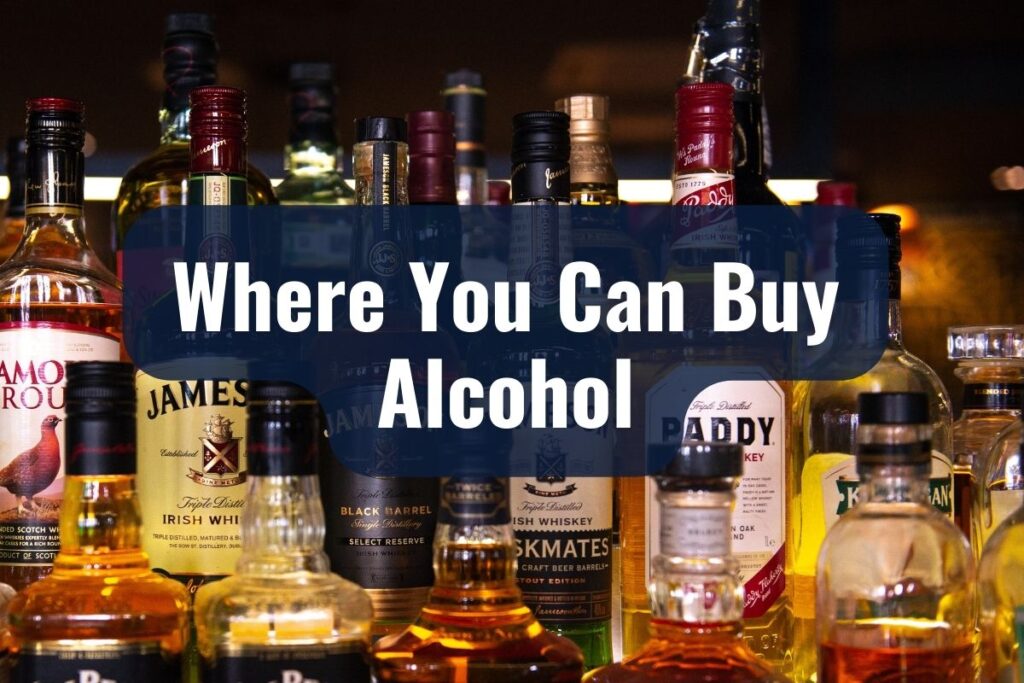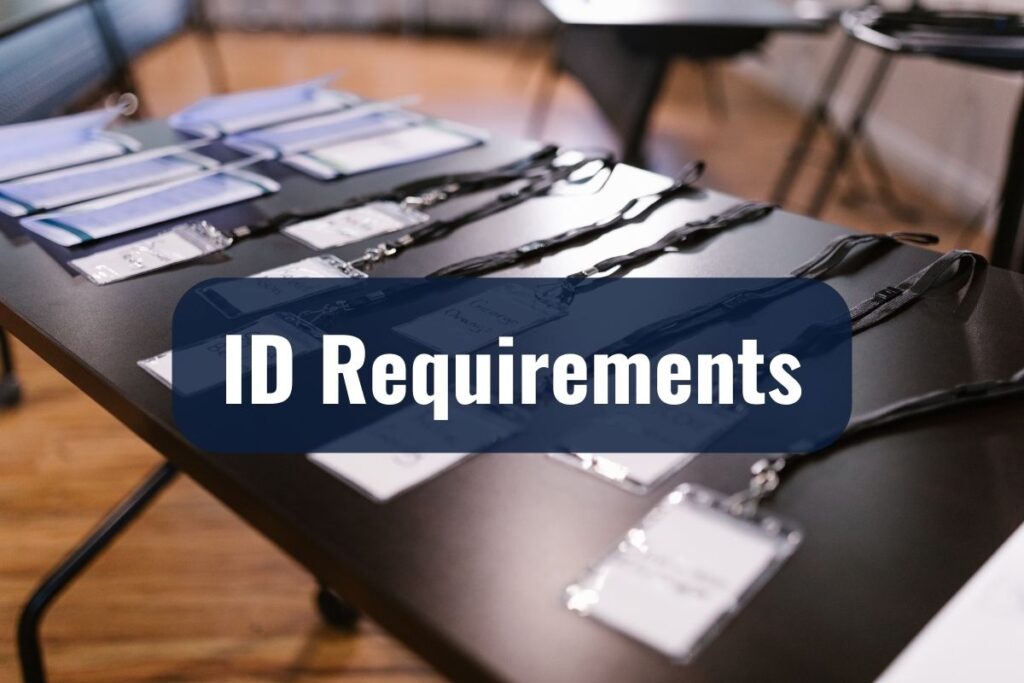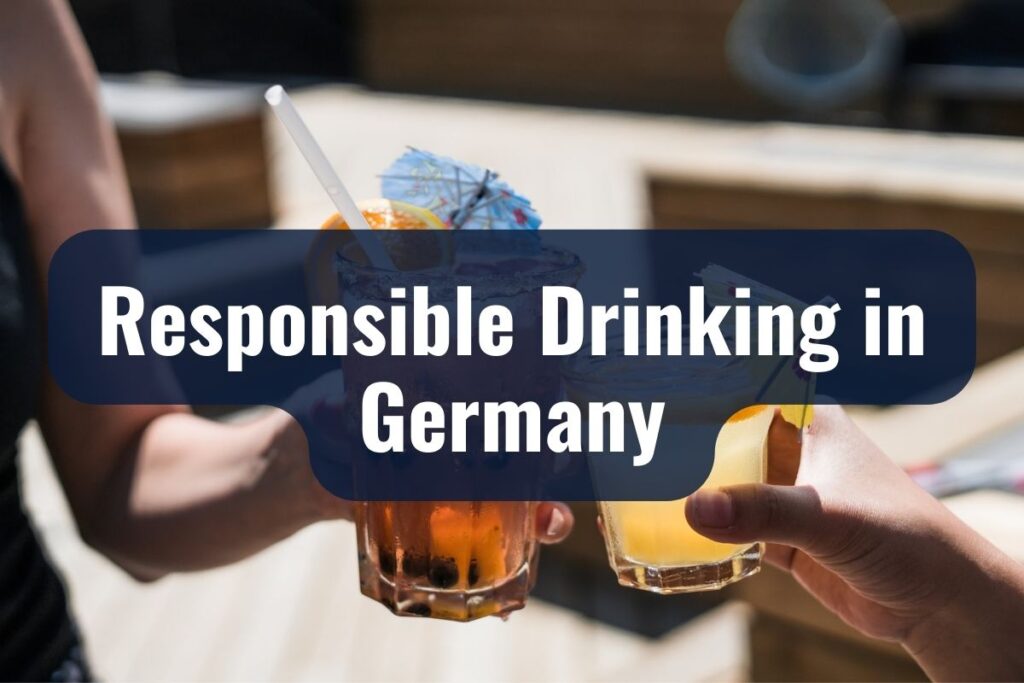The social norms surrounding alcohol and the legal guidelines for its consumption are also important aspects that can significantly affect your experience in the country. Knowing the drinking age, along with the laws and customs that go hand in hand with it, is essential for both enjoying your time responsibly and staying on the right side of the law.
In this article, we’ll explore the legal drinking age in Germany, where you can purchase alcohol, ID requirements, and much more.
Key Takeaways
- The legal drinking age in Germany is 16 for beer and wine and 18 for spirits and liquors.
- Alcohol can generally be purchased at supermarkets, convenience stores, bars, restaurants, and online shops.
- Proper identification like a passport or EU ID card is essential for purchasing alcohol.
- Violating alcohol laws can result in fines, criminal charges, and social repercussions.
The Legal Drinking Age in Germany
Understanding the legal drinking age in Germany is crucial for anyone planning to partake in local festivities, dining experiences, or simply enjoying a casual drink. German laws clearly define the age at which individuals can purchase and consume different types of alcoholic beverages.
Age Limit for Beer and Wine
In Germany, once you reach the age of 16, you are legally allowed to consume and purchase “fermented” alcoholic beverages. This category primarily includes:
- Beer
- Wine
- Wine-based beverages like certain types of cider
Age Limit for Spirits and Liquors
For stronger alcoholic drinks such as spirits and liquors, the age restriction is a bit more stringent. You must be 18 years old to consume and purchase legally:
- Vodka
- Whiskey
- Rum
- Other spirits and liqueurs
How the Drinking Age is Enforced
German authorities take the enforcement of drinking age laws seriously. Retailers, bars, and restaurants are legally required to check identification if there is any doubt about a customer’s age. Failing to comply with these laws can result in severe penalties for the establishment, including fines and the potential loss of their liquor license.
It’s also worth noting that these rules aren’t just ‘on paper’; they are actively enforced. Whether you’re at a supermarket, a bar, or a music festival, expect to be asked for identification if you look under the legal drinking age.
Cultural Norms and Social Context

While knowing the legal drinking age is essential, understanding the cultural norms and social contexts surrounding alcohol consumption in Germany can help you navigate social situations more effectively. Alcohol does play a significant role in German culture, but a set of unwritten rules and expectations also accompanies it.
The Role of Alcohol in German Society
In Germany, alcohol is often seen as a social lubricant that enhances gatherings, be it a casual get-together, a family celebration, or traditional events like Oktoberfest. Beer, in particular, is deeply ingrained in German culture and is commonly consumed during meals or social gatherings. Wine is also popular, especially in regions known for their vineyards, like the Rhineland and Baden-Württemberg.
Typical Drinking Settings
Various settings in Germany are designed for the consumption of alcohol:
Beer Gardens: A quintessential part of German culture where people enjoy beers outdoors, often with simple food like pretzels.
Festivals: Events like Oktoberfest in Munich or wine festivals in different regions offer a unique drinking experience.
Pubs and Bars: Traditional German pubs (known as “Kneipen”) and modern bars provide diverse settings for alcohol consumption.
Public Drinking Laws
Public drinking is generally legal in Germany, which is quite different from many other countries. However, it’s important to note that some areas and specific modes of public transport may have restrictions on alcohol consumption.
For example, drinking alcohol is usually prohibited on trains and buses. Always look for signs or ask if you’re unsure about the rules in a particular place.
Public Drunkenness
While drinking alcohol is culturally accepted, public drunkenness is frowned upon. Germans generally place a high value on responsible drinking. Being visibly drunk can not only be socially embarrassing but also have the potential to get you into legal trouble.
By being aware of the social and cultural norms surrounding alcohol consumption in Germany, you can enjoy local beverages in a manner that is both respectful and responsible.
Where You Can Buy Alcohol

Finding a place to buy alcohol in Germany is generally a straightforward task, given its availability in various types of establishments. However, knowing where to go for what kind of experience or product can enhance your time in the country.
Supermarkets and Convenience Stores
For everyday purchases, supermarkets and convenience stores offer a wide range of options:
Stores like Edeka, Rewe, and Lidl have extensive alcohol sections where you can find a variety of beers, wines, and spirits. You’ll often find special deals and a large selection of both local and international options.
Smaller shops, often referred to as “Spätis” in Berlin or “Kiosk” in other parts of Germany, offer a more limited selection but are often open later than traditional supermarkets.
Bars and Restaurants
If you’re looking to enjoy alcohol as part of a dining experience or a night out, bars and restaurants are your go-to:
Bars typically offer a broad range of alcoholic beverages, from beers on tap to an array of spirits and cocktails. Some bars may also specialize in certain types of drinks, like whiskey bars or craft beer pubs.
Most restaurants offer a selection of alcoholic drinks. Whether you’re dining in a traditional German restaurant or an international eatery, you’ll usually find a beverage menu with options that complement the cuisine.
Online Shops
Online alcohol shopping has become increasingly popular, especially for those who prefer the convenience of delivery:
Various websites specialize in alcohol delivery, offering everything from common brands to rare and exotic options.
Some cities have services that will deliver alcohol to your door within a specific time frame, usually under an hour.
ID Requirements

Ensuring you have the proper identification is key when planning to purchase or consume alcohol in Germany. While the country’s establishments are generally stringent about checking IDs, being prepared can save you from an inconvenient situation or even legal complications.
| Type of Identification | Generally Accepted | Notes |
| Passport | Yes | Safest bet for foreigners |
| European Union ID Card | Yes | Accepted for EU citizens |
| Foreign Driver’s License | Sometimes | Less commonly accepted and not guaranteed |
What Identification Is Typically Accepted
Germany accepts several forms of identification for the purchase of alcohol, but not all IDs are considered equal. Here are some commonly accepted forms:
Passport: A valid international passport is generally the safest bet for foreigners.
European Union ID Card: If you’re a citizen of an EU member state, your national ID card is usually acceptable.
Driver’s License: Some places might accept a foreign driver’s license, but this is less common and not guaranteed.
When You Are Most Likely to Be Asked for an ID
While German law requires establishments to check the ID of anyone who appears underage, the level of strictness can vary depending on the setting:
- Supermarkets and Convenience Stores: These places are generally strict about ID checks, especially during late hours. Even if you’re above the legal drinking age, don’t be surprised if you’re asked to show identification.
- Bars and Restaurants: These establishments may exercise some discretion, but they are still obligated to ask for ID if there’s any doubt about your age. Often, the younger you look, the more likely you are to be carded.
- Online Shops: If you’re ordering alcohol online, you may be asked to provide proof of age during the purchasing process, and the delivery personnel may also request to see an ID upon arrival.
Consequences of Breaking the Law
While Germany offers a broad and culturally rich drinking landscape, it’s vital to remember that failing to adhere to the legal drinking age and regulations can lead to serious consequences. Whether you’re a resident or a visitor, the rules apply to everyone, and breaking them can mar your experience in the country.
Legal Repercussions
The consequences for breaking the drinking age laws in Germany can range from minor to severe, depending on the circumstances:
Fines: The most common repercussion for minors caught purchasing or consuming alcohol is a monetary fine. The amount can vary based on the severity of the offense and whether it’s a repeat violation.
Criminal Charges: While less common, more serious or repeated offenses could lead to criminal charges, particularly if the individual is found supplying alcohol to minors.
Establishment Penalties: The establishment caught selling alcohol to minors also faces stiff penalties, including hefty fines and even the risk of losing their liquor license.
Social Consequences
Apart from the legal ramifications, there are also social consequences to consider:
Establishments may refuse service or even ban individuals who have been caught breaking the law.
Repeated offenses can lead to a tarnished reputation, both personally and socially, which can have broader implications for your life in Germany.
Irresponsible behavior around alcohol can also negatively affect the community, leading to stricter regulations and spoiling the atmosphere of social gatherings and public events.
Responsible Drinking in Germany

While enjoying the freedom and social aspects of drinking in Germany, it’s crucial to approach alcohol consumption responsibly. Responsible drinking is not just a legal obligation; it’s a social expectation that can profoundly impact your well-being and that of others.
Knowing Your Limits
The first step to responsible drinking is knowing your limits. Unlike some other countries where binge drinking may be more common, Germans generally prioritize moderation. Overindulgence puts you at risk of breaching social norms and has health implications.
Designated Drivers and Public Transport
If you plan on consuming alcohol, make transportation arrangements in advance to ensure you don’t drink and drive. Always designate a sober driver if you’re using a personal vehicle.
Germany has an excellent public transportation system, including buses, trams, and trains, which provides a safe alternative to driving.
Related: All you need to know about major international and regional airports in Germany
Alcohol and Health
While enjoying alcoholic beverages, it’s also essential to consider the potential health implications.
Be mindful of the calories in alcoholic drinks, especially beer, which can be quite high.
If you’re taking any medication, consult a healthcare provider about potential interactions with alcohol.
Excessive alcohol consumption over an extended period can lead to health issues like liver disease, heart problems, and an increased risk of accidents.
Safety Tips
Here are some additional safety tips to keep in mind:
- Avoid mixing different types of alcoholic beverages to lessen the impact on your body.
- Always keep an eye on your drink to prevent any unwanted substances from being added.
- Consume water and non-alcoholic beverages intermittently to stay hydrated.
Additional Resources
If you find yourself in a situation that requires urgent medical or police assistance, you can use the following emergency numbers:
- Medical Emergency: 112
- Police: 110
These emergency services operate 24/7 and can provide help in multiple languages.
Some apps can help you monitor your alcohol intake and even estimate your blood alcohol concentration (BAC):
AlcoDroid Alcohol Tracker: Helps you keep a diary of your alcohol consumption.
DrinkControl: Allows you to track and analyze your drinking habits.
FAQs
What is the legal drinking age for beer and wine in Germany?
The legal drinking age for beer and wine in Germany is 16 years old. However, for spirits and liquors, you must be at least 18 years old.
Is public drinking allowed in Germany?
Public drinking is generally permitted in Germany, although there are exceptions. Some areas, like certain parks or public transport systems, may have restrictions or bans on alcohol consumption.
Can I use a foreign ID to purchase alcohol?
A valid international passport is generally the safest form of ID for foreigners. Some places might accept a foreign driver’s license, but it’s not guaranteed.
Is it common for establishments to check ID?
Yes, establishments like supermarkets, convenience stores, and bars are obligated to check the ID of anyone who appears underage. The stringency of the checks can vary by location and time of day.
What are the penalties for underage drinking?
Underage drinking can result in fines for both the individual and the establishment selling the alcohol. More severe or repeated offenses could potentially lead to criminal charges.
What should I do if I suspect someone has alcohol poisoning?
Call emergency services immediately by dialing 112. Alcohol poisoning is a serious medical emergency that requires immediate attention.
Are there services to help me get home safely after drinking?
Yes, Germany has a robust public transportation system. Taxis are also readily available, and some services even specialize in ensuring people get home safely after consuming alcohol.
By addressing these common questions, we hope to clarify any uncertainties you may have about drinking in Germany. Being well-informed contributes to a safer and more enjoyable experience for everyone involved.


